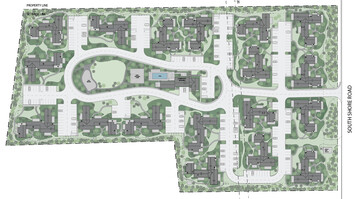Surfside Crossing Back In The Spotlight As Remand Hearing Begins This Week
Jason Graziadei •

The next chapter in the saga of the controversial Surfside Crossing development is set to begin this week when the Zoning Board of Appeals opens the remand hearing for the 40B project slated for South Shore Road.
It's been more than six years since the housing development was first proposed by developers Jamie Feeley and Josh Posner, which immediately sparked resistance from neighbors and other community members over the size, scale, location, and appropriateness of the project.
Thursday's hearing comes nine months after a Nantucket Superior Court judge vacated the state approval of the proposed 156-unit condominium development and remanded the matter back to the local Zoning Board of Appeals for further review. Judge Mark Gildea's decision was the result of legal challenges brought against the project by the Nantucket Land Council and a group of neighbors. They had appealed the state Housing Appeals Committee's approval of the project in September 2022, and its ruling that Surfside Crossing's 156 condominium unit proposal under Chapter 40B did not constitute a "substantial change" from what had previously been approved by the Nantucket Zoning Board of Appeals: a scaled-down development of 60 single family homes and 96 condominiums.
During the remand hearing, the members of the ZBA will be limited to considering "only the changes in the housing proposal or aspects of the proposal affected thereby," including: building types and their architectural style; the number, location, and size of the buildings; increases in building heights; the number and location of parking spaces; traffic circulation and roadways; and open space. Those areas were identified by Werner Lohe, the presiding officer of the state Housing Appeals Committee, in a July 16, 2024 remand order that followed Gildea's decision.
The members of the ZBA were presented with more than 1,000 pages of documents ahead of Thursday's meeting, including a new letter from the Surfside Crossing developers.
"The applicant firmly believes that the project as modified presents a very attractive development that makes a significant contribution to addressing the serious community need for not only affordable homeownership units, but also for market-rate units for year-round residents," Surfside Crossing attorney Paul Haverty wrote to the ZBA on behalf of Feeley and Posner. "The project as modified has already undergone a full review by the Committee, which has determined that there are no issues of local need that outweigh the regional need for affordable housing."

Among the deluge of information and documents submitted to the ZBA ahead of Thursday's meeting were numerous letters from island residents voicing their opposition to the controversial project.
"There are so many reasons for opposing this project, least of all the fact the developers have dealt with the public and the town in a very underhanded and dishonorable manner," Gretchen and David Callahan wrote. "Concerning the overbuilding on this lot which the original zoning would have only allowed for 21 dwellings…to overbuild this lot to 156, or even at 100 is too many. How many cars can fit on this street? If there is only two cars per unit, that's 312 cars being added to an already busy intersection. It is beyond imagination. Like I said, there are just too many concerns regarding this project, just say NO!"
While Surfside Crossing has been hotly debated on the island since it was first proposed in 2018, the state Housing Appeals Committee approved the developers’ 156 condominium unit proposal in September 2022 over the objections of the Nantucket Land Council, along with a group of neighbors and community members known as Nantucket Tipping Point, and at the time, the town’s Zoning Board of Appeals (ZBA). The HAC's ruling vacated the ZBA’s decision to permit a scaled-down development of 60 single-family homes and 96 condos and requires it to issue an amended comprehensive permit allowing for the 156 condominium units of the development to move ahead.
The project developers started clearing the property last August 2023 under protest and acknowledged they were starting construction on an "at risk" basis with the legal appeals still pending.
As it stands today, Surfside Crossing’s 156 condominium homes would be contained within 18-three-story buildings (two stories above grade) on 13 acres of pine forest off South Shore Road that were cleared last August. As a Chapter 40B development, 25 percent of those units are required by the state to be deed restricted for affordable housing, or a total of 39 units within the development, to residents earning at or below 80% of the area median income. The other 117 units would be sold at market rate, priced between $500,000 to $1.5 million.
In April 2023, the town announced that it was dropping its lawsuit against Surfside Crossing after reaching a “collaborative agreement” with the developers. The agreement outlines a commitment by the Select Board and the Surfside Crossing developers to earmark 75 percent of the 156 condominiums in the development to “directly serve year-round housing needs.” That goal would be accomplished through long-term deed restrictions at a variety of income levels. Critics noted at the time that there was nothing in writing that could bind Surfside Crossing's developers to such restrictions, and the dismissal of the town's lawsuit sparked frustration from ZBA board member Jim Mondani in May and “blindsided” the board as a whole.
Developer Jamie Feeley subsequently said in a statement that he hoped potential partnerships and collaborations with the town, as well as with island businesses and organizations, would result in up to 75 percent - the 117 market rate units - ending up in local ownership.
The plans for Surfside Crossing were filed under a state statute known as Chapter 40B, which allows developers to bypass local zoning regulations and increase density if at least 20 to 25 percent of the new units have long-term affordability restrictions.